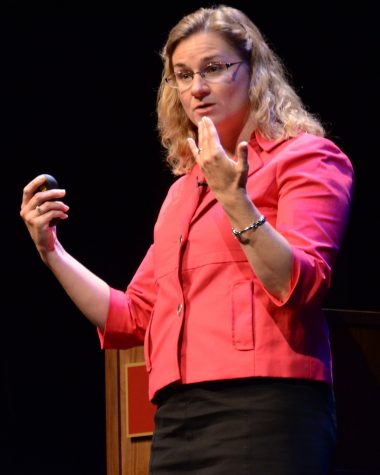It’s no longer enough to teach reading, writing and arithmetic. Teachers must also emphasize “the four Cs” - critical thinking, creative problem solving, collaboration and communication, said Michelle Shearer, the 2011-12 National Teacher of the Year who addressed hundreds of North Carolina Teaching Fellows visiting Elon University for a weekend conference for college seniors throughout the state studying to be educators.

In her July 15 evening remarks in McCrary Theatre, which featured PowerPoint slides projected on an overhead screen, Shearer recounted how she discovered her passion for teaching and how she maintains that level of enthusiasm despite public sentiment against teachers and a profession ravaged by budget cuts in recent year.
Her primary message, however, is that tomorrow’s teachers must know what traits will be required of their students after graduation.
“Those are called 21st century skills. Put whatever label on it that you want… those are the skills we’re trying to develop,” Shearer said. “And these are the skills that people in the work place want from our students, and we need to prepare them on all levels. … You’ve got to wrap these sills around whatever particular activity your doing.”
She also reminded the hundreds of Teaching Fellows before her that they must connect with students if they want their pupils to excel. It won’t always be easy, she added.
“Students want their teachers to be engaged. This is a people business that you’re in. They want to connect with you… and there are going to be days when that’s going to be difficult,” Shearer said. “Teachers do the work from which all of society benefits. So on difficult days, sometimes it’s helpful to have an inspirational quote to help you remember why you came into this profession in the first place.”
Shearer teaches Advanced Placement chemistry at Urbana High School in Maryland. As an advocate for science, technology, engineering and mathematics education for students in kindergarten through high school, she has achieved notoriety for inspiring children traditionally underrepresented in scientific fields, including those with special needs and those from diverse racial and socioeconomic backgrounds.
She previously taught high school chemistry and mathematics at the Maryland School for the Deaf in Frederick. As Shearer shared with the audience, she knew no American Sign Language prior to volunteering with a school for deaf children while studying at Princeton University. In a few short years, her fluency allowed her to connect with students who had a range of hearing impairments at the Maryland school where she launched her decorated career.
Shearer shared several recommendations for accommodating students with special learning needs, a list that included:
– Focus student abilities, not their disabilities
– Create a shared identity
– Incorporate technology as needed
– Validate students’ efforts to compensate
– Give tasks that play to their strengths
“I didn’t know all this stuff when I started student teaching. These are things I learned over time,” she said. “You also need to be ready to bring your own ideas to the table. We’re all in this together.”
An annual summer conference for rising junior Teaching Fellows is scheduled for July 22-24 on Elon University’s campus.
The Teaching Fellows conferences come just weeks after state lawmakers passed a budget the phases out the program beginning in 2012. Jo Ann Norris, president and executive director of the North Carolina Teaching Fellows Program, urged her audience to inform elected officials of how important the program is to them and, by extension, to the tens of thousands of North Carolina students taught each year by Teaching Fellows alumni.
“The train was on the track, and there was no stopping it, and no slowing it down. I now must ask you to become an active player in the campaign to get the House and Senate leadership to reinstate your Teaching Fellows program,” Norris said of the recent budget cut. “I’m asking you, every rising senior teaching fellow, to send one letter each month to each of your legislators with a copy to the leadership in that chamber. I’m asking you to send an email to your legislators, and a copy to the leadership, every week. They have to hear from you. They have already heard from me.”


